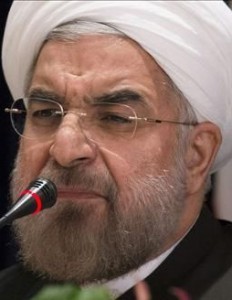Reformists disillusioned with Rouhani
Oct 31st, 2013The Iranian regime has used Hassan Rouhani’s win in the recent election to legitimise its governance and to try and win back the hearts of the nation in order to drive them back to the ballots. According to Rouhani: “the election has wiped away all doubts and rumours not only about the elections itself but also on the legitimacy of the regime, it has cleansed the Islamic Republic of all the dust and clouds that were covering it.”
However, it seems that disillusion about the new government is already taking place. The best manifestation of it is the level of disenchantment and disappointment amongst the reformists, who were Rouhani’s most ardent supporters during the election and naturally expected that the new government’s first step would be to reconcile with them, invite their exiles back to the homeland, free their political prisoners and end the Green Movement leaders’ house arrests.
However, it soon became clear that not only was the release of the reformist prisoners not on the agenda, but that the Judicial Body had announced that should any of the exiles return to Iran, they would face interrogation and prison, instead of the red carpet they were expecting.
The next nail in the coffin was the selection of the cabinet ministers and the choice of Mostafa Pour Mohammadi, the torturer of the notorious Evin prison, responsible for the death of thousands of political prisoners as the Minister of Justice.
Furthermore, the unprecedented escalation in the number of executions, the oppression of women, the implementation of a law allowing men to marry their adopted daughters and the nationwide policy of suppression additionally demonstrate that the system governing the country has not changed at all. Marzieh Afkham, the Spokeswoman for the Ministry of Foreign Affairs was quick to hit back at Ahmad Shaheed, the United Nations Special Rapporteur for Human Rights in Iran, following his report on the violation of human rights in Iran. She stated that:” Ahmad Shaheed’s report has no legal basis and we do not recognise his role. Iran considers the allegations of the Special Rapporteur for Human Rights as an insult to the great nation of Iran and as such does not recognise them.”
The next step was the closure of the Bahar Newspaper on the orders of the Media Supervisory Board. It seems that the paper had displeased the ayatollahs in Qom and Jannati, the Minister of Culture and Islamic Guidance defended the closure in his interview with the media, claiming that the paper’s track record of insulting religious sanctities justified the move.
The final nail in the coffin was the hurling of insults and attack on Mir-Hossein Mousavi and Zahra Rahnavard’s daughters last week. The reformists considered it a national disgrace and an insult to the noble people of Iran, expecting a response from Rouhani’s government, however, at the fringe meetings of the Cabinet session, the Minister of Justice, Pour Mohammadi stated that: “The events were sensationalised by the media. Such investigations are normal procedures conducted within the Islamic Republic as is done in other countries.”
This was a milestone in forcing the government reformists to wake up and smell the coffee, which the reformist leaders certainly have given their angry public reactions to Rouhani’s inaction.
While visiting Karoubi’s family, Abdullah Nouri, former interior minister in reformist government of Khatami stated: “Mr Rouhani and his government must not forget that the majority of his voters were those fed up with the lawlessness, the violation of citizen rights and narrow-mindedness of the previous government and chose him in order to bring change. I believe that what the majority of the people who took part in the recent elections wanted and still want from the new government is a change in the police state and to be given their citizen and civil rights.”
In a statement addressed to Rouhani, the Coordination Council for the Green movement declared: “We expect Mr Rouhani to firmly condemn the obscene attack which took place during his presidency and appease Rouhani and Rahnavard’s daughters. He must also provide a platform of action on how he intends to implement the rule of law, prevent further such attacks and prove that he will keep his election promises.”
The reformists’ dismay and disillusionment with Rouhani was at such an extent that in a recent article, the reformist columnist Sajad Salek wrote:
“It is not necessary to hold our ears to the ground in order to hear how dissatisfied Rouhani’s government supporters are. These days, we are witnessing serious criticisms on certain conducts, inactions, appointments and disregards by the new government in informal gatherings and online. Disregarding the demands and expectations of the purple movement that supported Rouhani will create a gap which will have undesirable consequences for the new government. Thus, despite their efforts to implement justice, the government must send a clear message to their supporters that: we hear you, we are with you and we will uphold our promises.”
The reformists’ disenchantment and the fact that the bubble of illusions about Rouhani has burst so prematurely, proves the bitter reality that not only is the Velayate Faghih system incapable of reform but that the sham elections’ only function was to fool the people of Iran and the international community, with the oppressed Iranians being the losers of the game once again.
Hassan Dai (Daioleslam) is a human rights activist, political analyst and editor of the Iranian American Forum. He is well-published in Farsi and English and frequently appears as an expert guest on the Voice of America and major Persian language media.


